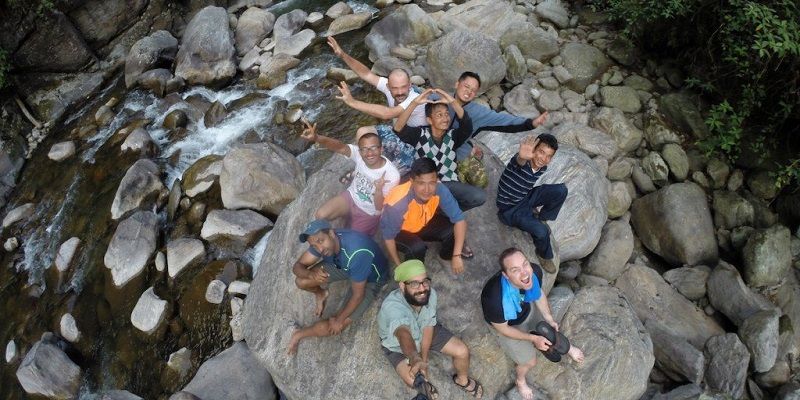How two American India Foundation fellows started an eco-tourism company in India
As the thermostats across the Indian plains rise, and eyes and hearts look northwards in search of cooler mountain air and quiet moments of solitude, the founders of Voygr offer a paramount reminder: trek and explore sensitively, and leave no trace.
Voygr, co-founded by Behzad Larry and Elijah Monroe in 2014, strives to re-orient the conversation on adventure-where ecological sustainability is the foundation- and fair livelihoods for guides and mountain communities, the glue that holds the trekking community together. Avid mountain lovers with experience working in the Indian development space, Behzad and Elijah came up with the idea for Voygr following a conversation with a guide while trekking in Sikkim in 2012. As Behzad, Voygr’s CEO, explains, he was asked a question he has answered many times before, “How much did you pay?” He quickly learned that 60 per cent of what he paid went to the middlemen, while the guide was left with 40 per cent of the total cost to arrange every aspect of the trek.”


Behzad explains, “I had previously worked on systems that cut out middlemen in waste management chains to make the system fairer. So hearing this exorbitant commission instantly triggered the thought that a fairer system could be built in adventure travel. I researched the industry for over a year, and then moved back to India in August 2013 after quitting my job running the Clinton Fellowship’s operations in the US.”
Eli joined the team, and, since 2014, Voygr has taken shape. It’s is comprised of two parts: Voygr.com, the for-profit entity that sells all sorts of adventures: treks, rafting, mountaineering expeditions, photography workshops, and motorcycle trips; and Voygr.org, the registered non-profit. Voygr is an official partner of Leave No Trace, and a member of the International Ecotourism Society. All trips sold through voygr.comcontribute to carbon offsets and conservation efforts.
Voygr.com is working to position itself as a one-stop shop for trusted sustainability and mountain tourism. Each Voygr trip ismade in partnership with local outfitters and run by a local guides that come vetted by the Voygr team for safety, environmental sustainability and quality . Once a few trusted outfitters are established in an area, Behzad and Eli work with their guides to set trek prices for the region that reflect the cost of their high quality certifications, cost of carrying supplies that are environmentally sustainable and living wages for all parties involved. All treks are held to the strict standards of Leave No Trace and International EcoTourism Society mentioned above.
Voygr.org focuses on developing ecotourism as a rural livelihood that is fair and environmentally sustainable by re-investing a large percentage of voygr.com profits to offset the environmental costs of tourism in sensitive ecosystems.Currently, this includes investing in water filters that eliminate the need to boil drinking water helping to decrease the amount of wood used during treks. Cooking gas is expensive and difficult to transport tovillages, and, therefore,mostlocals rely on wood from pristine forests. During peak season, tourist lodges and tea huts can use over 100 kilos of wood a day.It’sa problematic consumption level compared to the slow growth rate of high altitude forests.

Voygr’s treks are priced to reflect their environmental sensitivity, and the cost of providing fair wages to homestays, porters, and guides.
The Voygr team is comfortable with this. Their model urges consumers to think harder about their impact when travelling, especially in regards to pricing.Trekking companies that offer extremely low prices often force guides to cut corners in ways that negatively impact the poorest of the poor and the environment one sets out to enjoy in the first place, Behzad explains. Lower consumer prices come at a cost to someone along the trek supply chain, and Voygr wants all nature lovers to remember this.
At the crux of Voygr’s model is the paradox of travel in rural areas. Communities rely on the income generated by tourists, but tourists, simultaneously, stress environmentally sensitive zones and resources. Behzad says, “There can be no tourism that has zero footprint. Even when we make sure we’re being environmentally conscious and ethically fair, there are still various ways in which our presence alters environments and culture.” For those that staunchly espouse sustainability, the best thing to do is not travel at all, says Behzad, “But if you’re going to travel, then you must do so making every possible effort to minimize your footprint.”

Behzad and Eli learned a critical lesson that shaped the evolution of their work. Originally, Voygr strove to work with guides in more remote areas with the hope of re-distributing the money generated through tourism.However, they quickly discovered that connectivity in very rural areas was a challenging barrier to overcome, at this stage, in their business development. As a result, Voygr revised their model to work with existing guides dedicated to sustainability in better connected areas with the hope thatregional managers can eventually be hired to build relationships with more remote guides and communities(connecting them with the tourism industry).
In the long run, Voygr hopes to position itself as a global player for sustainable treks and tours, reflecting the broader movement on eco-tourism as a form of conservation, preservation and livelihood generation. Voygr offers an important reminder: “We can’t stop the global travel industry. So let’s make it better.”
To book a trek with Voygr, and learn more about their work, please visit their website at Voygr.com. To learn more about eco-tourism, sustainability and the impact of travel on the environment, please check out the following resources:
https://lnt.org/ and http://www.ecotourism.org/
image credits: Behzad Larry









![[The Turning Point] How lessons from the dot-com crash in 2000 helped Nazara Technologies become a Rs 5,000 Cr gaming company](https://images.yourstory.com/cs/2/70651a302d6d11e9aa979329348d4c3e/Feature-Images-0ii-1631177015760.png)

